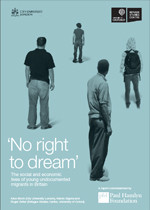Case study: Kawa
Kawa is a 25-year-old Kurdish man who has been living in the UK for seven years. All his immediate family are in Kurdistan, but he does not want to do military service for Turkey, and felt that the lack of freedom for Kurdish people meant that he had no choice but to leave. Before he came to the UK, he was studying welding at a vocational school and had expected to go to university. He used traffickers to make his journey, and eventually arrived by train from Paris, and claimed asylum at Waterloo. His asylum case has since been rejected, and he is now an undocumented migrant.
When Kawa arrived in the UK, he was 18 and wanted to study English but when his asylum claim was rejected he was unable to do this. Kawa has travelled around the UK, going wherever he can to find work. He does not feel tied to any one place because his immediate family are in Kurdistan and he does not have a partner, as he feels that his situation does not facilitate close personal relationships.
Kawa’s work has been in the service and fast-food industry where he had a number of jobs. He currently works in a kebab shop, where he gets paid between £200 and £250 a week, depending on how many days he works. He doesn’t pay rent or utility bills, and can eat at the shop so he is able to save money. He sends money to his family when they need it, but mostly saves. Kawa has little in the way of a social life, spending his time either at work or above the shop watching Kurdish TV. He prefers to stay in because it is, ‘dangerous’ and he feels, ‘scared’ going out. He describes his everyday life:
I work at the kebab… I work six to seven days. I work all the time, I don’t go out a lot… The shop owner has an upstairs where I live. I sit there, I watch television, we have a satellite. We watch Kurdish TV, other than that I don’t go out a lot… At 12 we close the business, at 12 again we start work, from time to time we do cleaning. We clean it then we go upstairs to sleep and in the morning start work once again.
Kawa is not happy in his job and would prefer to work in a hotel or a restaurant rather than a fast food shop. He has noticed that undocumented migrants from Kurdistan are clustered in a few industries.
Kurds from Turkey work in kebab shops. To be honest a lot of my friends, Kurds from Iraq, work in building construction. They work in markets, off licences, that’s what they do, they do au pair work, a lot of my friends do that, car wash, off licence.
Undocumented migrants are paid less than others, but Kawa knows he has no choice over who he works for because of his lack of status. When asked about where employers ask for documents he says that English employers ask but ‘… Kurds, Turk, Chinese, they don’t ask you know, they don’t ask’. Kawa feels that things have become a bit easier for him over the years in the UK, though he says, ‘… life is truly difficult’. His immediate hopes for the future revolve around his status. Regularising status is the thing that opens up opportunities:
I want to be at least legal, I want to go to school, I want to work, I want to live here, I want a family.
